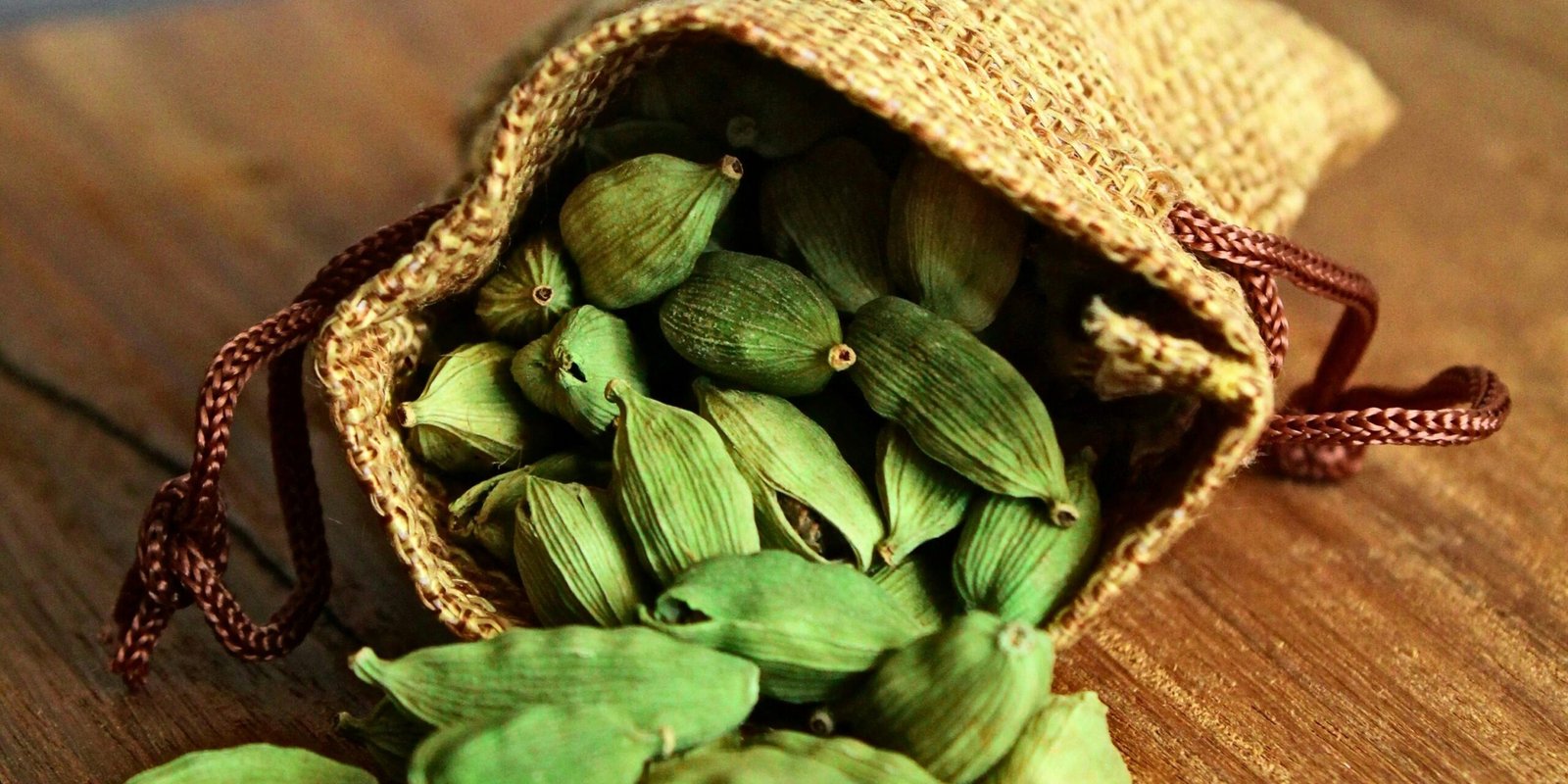Table of Contents
Cardamom, a fragrant spice derived from the seeds of plants in the ginger family, is not only prized for its unique flavour profile but also revered for its potential medicinal properties. Packed with essential nutrients, antioxidants, and bioactive compounds, cardamom offers a range of potential health benefits, from aiding digestion and freshening breath to reducing inflammation and promoting heart health.
Join us on this journey as we uncover the secrets of cardamom and explore how this aromatic spice can contribute to your overall health and well-being. Whether you’re a culinary enthusiast seeking to spice up your dishes or someone interested in natural remedies for common ailments, cardamom holds promise as a potent ally in your quest for wellness.
Cardamom, known for its aromatic and flavourful seeds, has its origins deeply rooted in the lush forests of the Western Ghats in southern India. Indigenous to the tropical regions of India, Nepal, and Bhutan, this spice has been cultivated and traded for thousands of years, dating back to ancient times. Initially prized for its medicinal properties, cardamom eventually gained popularity as a culinary spice, captivating palates across the globe with its distinct taste and aroma.
Traders from ancient civilizations, including the Greeks, Romans, Egyptians, and Arabs, sought out cardamom for its exotic allure and diverse applications. It became a prized commodity along the ancient spice routes, traded across vast distances and integrated into various cuisines and cultural practices.
Today, cardamom continues to be cultivated in its native regions as well as in other countries with suitable climates, such as Guatemala, where it thrives in the fertile volcanic soils. Despite its widespread cultivation, the essence of cardamom’s origin remains rooted in the vibrant landscapes of its native habitat, where it continues to be revered for its culinary and medicinal significance.
NUTRITIONAL VALUE
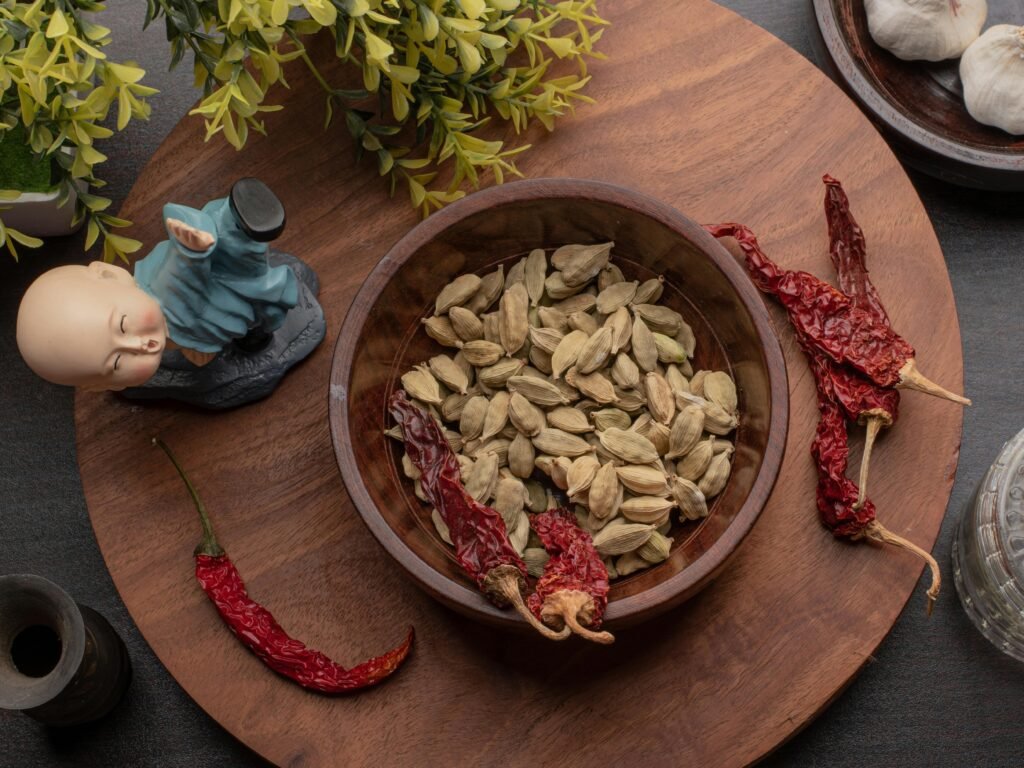
Cardamom, while primarily prized for its aromatic flavour and culinary versatility, also offers a modest yet notable nutritional profile. A 100-gram serving of ground cardamom seeds provides approximately 311 calories, primarily from carbohydrates. However, it is more commonly used in smaller quantities due to its intense flavour.
Cardamom is a rich source of essential nutrients, including vitamins and minerals. It contains significant amounts of vitamin C, a potent antioxidant that supports immune function and collagen synthesis. Additionally, cardamom is a good source of minerals such as potassium, calcium, magnesium, and phosphorus, which are essential for maintaining electrolyte balance, bone health, and muscle function.
Furthermore, cardamom contains small amounts of dietary fiber, which aids in digestion and promotes gut health. Its distinctive flavour and potential health benefits make it a valuable addition to a balanced diet when used in moderation.
HEALTH BENEFITS
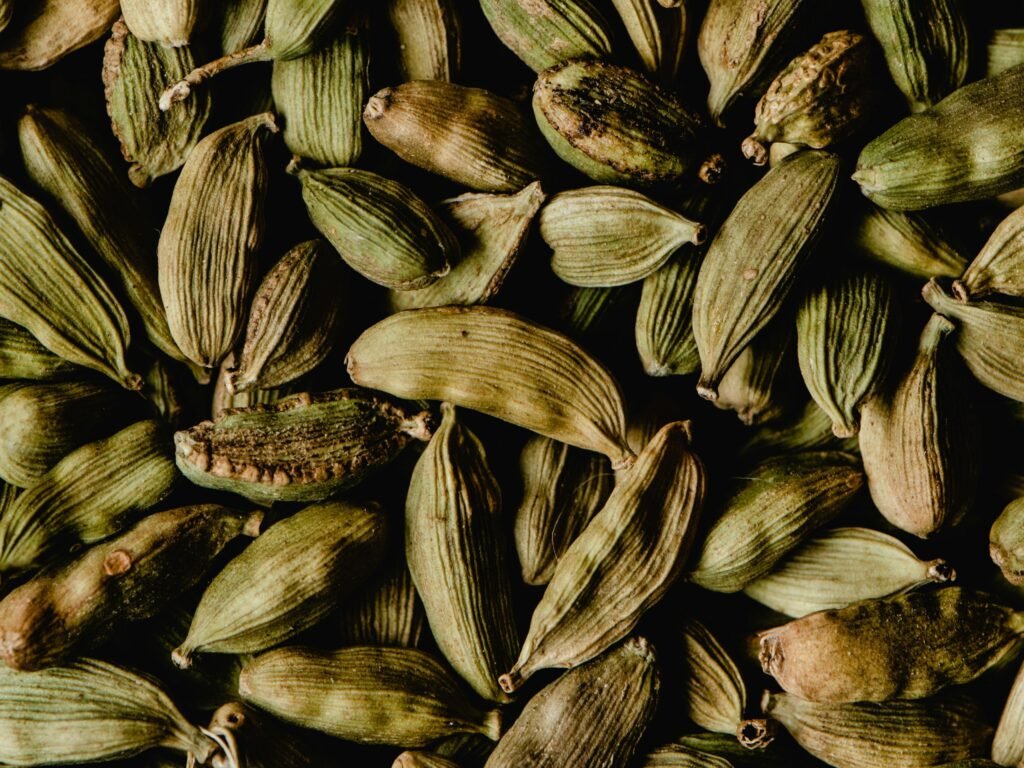
Cardamom, celebrated for its aromatic flavour and culinary versatility, offers a wide range of potential health benefits attributed to its rich nutritional profile and bioactive compounds.
DIGESTIVE AID
Cardamom has been traditionally used to promote digestion and alleviate gastrointestinal discomfort. It contains compounds like volatile oils, particularly cineole, which have carminative properties, helping to relieve gas, bloating, and indigestion. Additionally, cardamom stimulates the secretion of digestive enzymes, facilitating the breakdown of food and enhancing nutrient absorption.
ANTIOXIDANT PROPERTIES
Cardamom is a rich source of antioxidants, including flavonoids, phenolic compounds, and essential oils. These antioxidants help neutralize harmful free radicals in the body, protecting cells from oxidative damage and reducing the risk of chronic diseases such as heart disease, cancer, and neurodegenerative disorders like Alzheimer’s disease.
ANTI-INFLAMMATORY EFFECTS
Compounds found in cardamom, such as cineole, limonene, and terpinene, exhibit anti-inflammatory properties that may help reduce inflammation in the body. Chronic inflammation is linked to various health conditions, including arthritis, cardiovascular disease, and inflammatory bowel diseases like Crohn’s disease and ulcerative colitis.
ORAL HEALTH
Cardamom is known for its traditional use in promoting oral health and freshening breath. Its antimicrobial properties help inhibit the growth of bacteria in the mouth, reducing the risk of dental caries, gum disease, and bad breath. Chewing on cardamom seeds or using cardamom-infused mouthwashes may help maintain oral hygiene.
HEART HEALTH
Cardamom may benefit cardiovascular health by lowering blood pressure, reducing cholesterol levels, and improving lipid profiles. Compounds like cineole and limonene have been shown to have hypotensive and lipid-lowering effects, potentially reducing the risk of hypertension, atherosclerosis, and heart disease.
BLOOD SUGAR CONTROL
Preliminary studies suggest that cardamom may help regulate blood sugar levels and improve insulin sensitivity. Compounds found in cardamom, such as polyphenols and flavonoids, may enhance glucose metabolism, reduce insulin resistance, and lower blood glucose levels, making it potentially beneficial for individuals with diabetes.
RESPIRATORY HEALTH
Cardamom has expectorant and bronchodilator properties that may help alleviate respiratory symptoms such as coughs, congestion, and asthma. Compounds like cineole and camphene help loosen mucus in the airways, making it easier to expel, and may improve airflow to the lungs.
WEIGHT MANAGEMENT
Some research suggests that cardamom may aid in weight management by boosting metabolism and promoting satiety. Compounds like piperine and oleoresins found in cardamom have thermogenic properties that may increase calorie expenditure, while its fiber content may help promote feelings of fullness and reduce calorie intake.
MOOD AND STRESS RELIEF
The aroma of cardamom is believed to have mood-enhancing and stress-relieving effects. Inhalation of cardamom essential oil or its aroma may help reduce anxiety, improve mood, and promote relaxation, making it a popular ingredient in aromatherapy and herbal remedies for stress management.
LIVER HEALTH
Preliminary studies suggest that cardamom may have hepatoprotective effects, helping to protect the liver from damage and improve liver function. Compounds like cineole and limonene have been shown to have antioxidant and anti-inflammatory effects in the liver, potentially reducing the risk of liver diseases such as fatty liver disease and liver fibrosis.
PRECAUTIONS
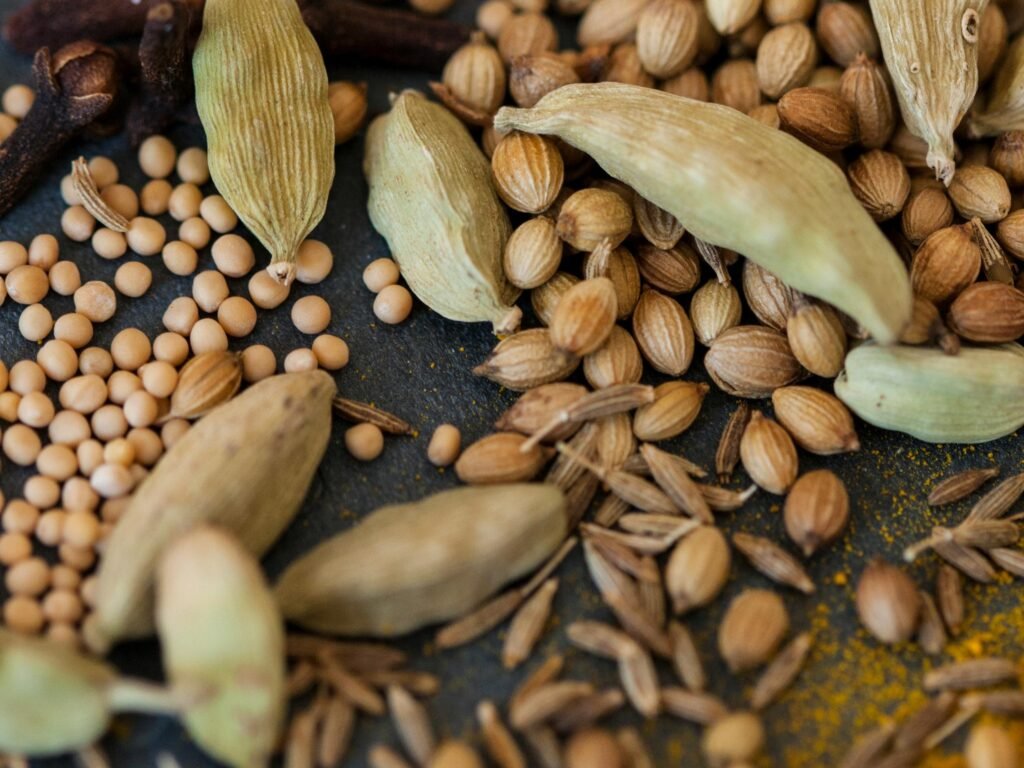
While cardamom is generally safe for most people when consumed in moderate amounts as a culinary spice, there are certain precautions and potential drawbacks to consider, especially for certain individuals. Here are detailed precautions and cons associated with cardamom:
ALLERGIC REACTIONS
Some individuals may be allergic to cardamom or develop allergic reactions upon exposure. Symptoms of cardamom allergy may include skin rash, itching, swelling, or difficulty breathing. Individuals with known allergies to other spices or plants in the Zingiberaceae family, such as ginger or turmeric, may be more likely to experience allergic reactions to cardamom.
PREGNANCY AND BREASTFEEDING
While cardamom is generally considered safe for culinary use during pregnancy, there is limited research on its safety in medicinal doses or concentrated forms such as supplements or essential oils. Pregnant or breastfeeding women should exercise caution and moderate their consumption of cardamom to avoid potential adverse effects. High doses of cardamom or cardamom supplements may stimulate uterine contractions and could potentially lead to miscarriage or premature labor.
GASTROINTESTINAL UPSET
In some cases, consuming large amounts of cardamom or cardamom supplements may cause gastrointestinal upset, including nausea, vomiting, and diarrhoea. Cardamom contains volatile oils and compounds like cineole, which may irritate the stomach lining and lead to digestive discomfort, particularly when consumed in excess or on an empty stomach.
BLOOD PRESSURE AND HEART RATE
Cardamom contains compounds like cineole and terpinyl acetate, which have mild hypotensive effects and may lower blood pressure and heart rate. While this can be beneficial for individuals with hypertension, those with low blood pressure or bradycardia should use caution when consuming large amounts of cardamom or cardamom supplements, as it may exacerbate these conditions.
DRUG INTERACTIONS
Cardamom supplements or extracts may interact with certain medications, including anticoagulants, antiplatelet drugs, and medications metabolized by the liver. Cardamom contains compounds that may enhance the effects of these medications or interfere with their metabolism, leading to potential side effects or interactions. If you are taking medication, especially blood thinners or liver medications, consult with your healthcare provider before using cardamom supplements or extracts.
SKIN SENSITIVITY
Cardamom essential oil is potent and may cause skin irritation or allergic reactions in some individuals, particularly when used undiluted or in high concentrations. It’s essential to dilute cardamom essential oil properly before applying it to the skin and perform a patch test to check for sensitivity. Discontinue use if you experience any adverse reactions such as redness, itching, or burning sensation.
INCORPORATING CARDAMOM INTO YOUR DIET
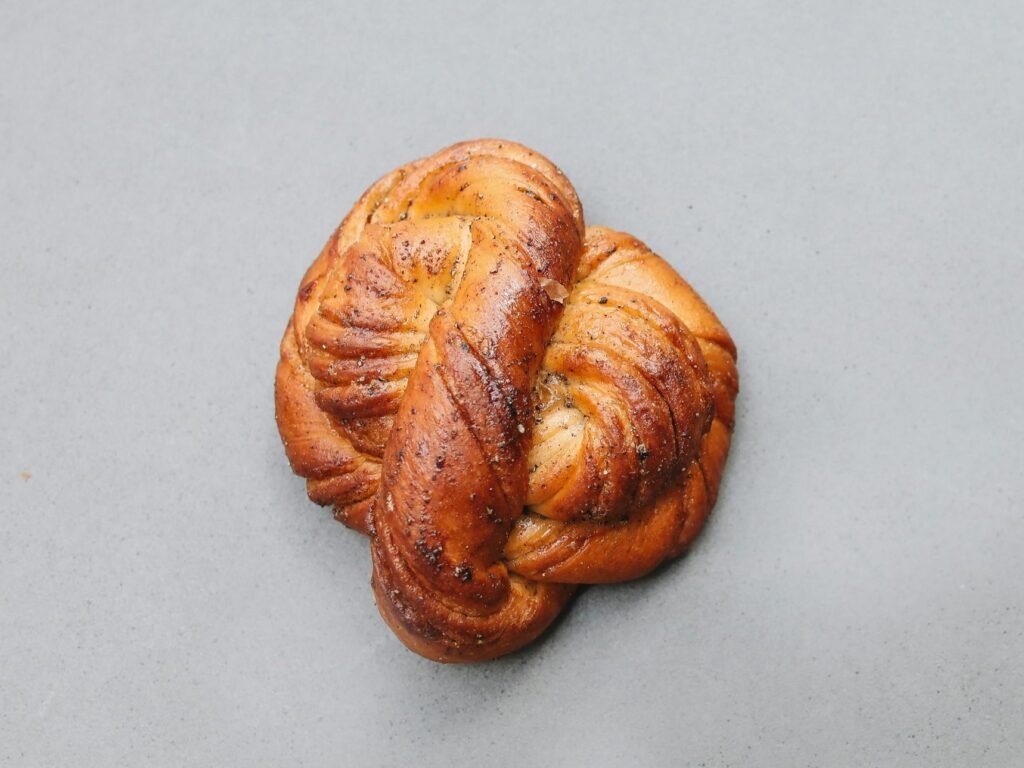
Incorporating cardamom into your diet is not only a flavourful way to enhance your dishes but also a nutritious addition that may offer various health benefits. Here are several detailed ways to use cardamom in your cooking:
- Sweet and Savoury Dishes: Cardamom’s versatile flavour profile makes it suitable for both sweet and savoury dishes. Add ground cardamom to baked goods such as cakes, cookies, and bread for a warm and aromatic flavour. You can also sprinkle ground cardamom over oatmeal, yogurt, or fruit salads for a hint of spice.
- Warm Beverages: Brew cardamom-infused tea by adding whole cardamom pods or ground cardamom to hot water along with your favorite tea leaves. Cardamom tea is soothing and aromatic, making it an excellent choice for relaxation or digestion. You can also add cardamom to coffee or hot chocolate for a unique twist.
- Curries and Stews: Cardamom is a common ingredient in many Indian and Middle Eastern savoury dishes, particularly curries and stews. Add whole cardamom pods or ground cardamom to your favourite curry recipes to enhance the flavour and aroma. Cardamom pairs well with other spices like cumin, coriander, and cinnamon in savoury dishes.
- Rice and Grain Dishes: Infuse rice and grain dishes with cardamom for added flavour and aroma. Add whole cardamom pods to the cooking water when preparing rice or quinoa, or sprinkle ground cardamom over cooked grains for a fragrant touch. Cardamom complements both savoury and sweet rice dishes, such as pilafs and rice puddings.
- Smoothies and Beverages: Incorporate cardamom into smoothies, juices, and cocktails for a burst of flavour. Add ground cardamom to fruit smoothies or vegetable juices for a unique twist. You can also muddle cardamom pods with herbs and citrus fruits to create refreshing cocktails or mocktails.
- Desserts and Baked Goods: Cardamom adds a delightful flavour to desserts and baked goods. Use ground cardamom to flavour custards, puddings, and ice creams. You can also sprinkle ground cardamom over fresh fruit or roasted nuts for a simple yet elegant dessert.
- Chutneys and Sauces: Make flavourful chutneys and sauces using cardamom as a key ingredient. Combine ground cardamom with other spices, fruits, and aromatics to create delicious condiments for grilled meats, fish, or vegetables. Cardamom chutney pairs particularly well with lamb or chicken dishes.
- Yoghurt and Dairy Products: Stir ground cardamom into yoghurt, kefir, or cottage cheese for a fragrant and flavourful snack. You can also add cardamom to milk-based beverages like lassis or milkshakes for an exotic twist. Cardamom-infused yogurt is a refreshing accompaniment to spicy dishes.
- Pickles and Preserves: Infuse pickles, jams, and preserves with cardamom for a unique flavour profile. Add whole cardamom pods or ground cardamom to pickling brines, fruit jams, or fruit preserves for a hint of spice and warmth.
- Homemade Spice Blends: Create your homemade spice blends featuring cardamom as a star ingredient. Combine ground cardamom with other spices like cinnamon, cloves, and ginger to make flavourful blends for seasoning meats, vegetables, or rice dishes.
In conclusion, cardamom emerges not only as a beloved spice renowned for its distinct flavour but also as a potent natural remedy with a myriad of potential health benefits. From aiding digestion and promoting oral health to reducing inflammation and supporting heart health, cardamom offers a versatile array of therapeutic properties that have been celebrated for centuries.
By incorporating cardamom into your culinary repertoire, whether as a seasoning in savoury dishes, a flavouring agent in desserts, or a fragrant addition to beverages, you not only enhance the taste of your meals but also harness the potential health-promoting effects of this aromatic spice. However, it’s essential to use cardamom mindfully and in moderation, especially in concentrated forms like supplements or essential oils, and to be mindful of any potential interactions or sensitivities.
As with any dietary or lifestyle change, it’s advisable to consult with a healthcare professional before using cardamom for medicinal purposes, especially if you have underlying health conditions or are pregnant or breastfeeding. With its rich history, versatile applications, and potential therapeutic effects, cardamom stands as a flavourful and aromatic ally in your journey toward holistic health and well-being.

